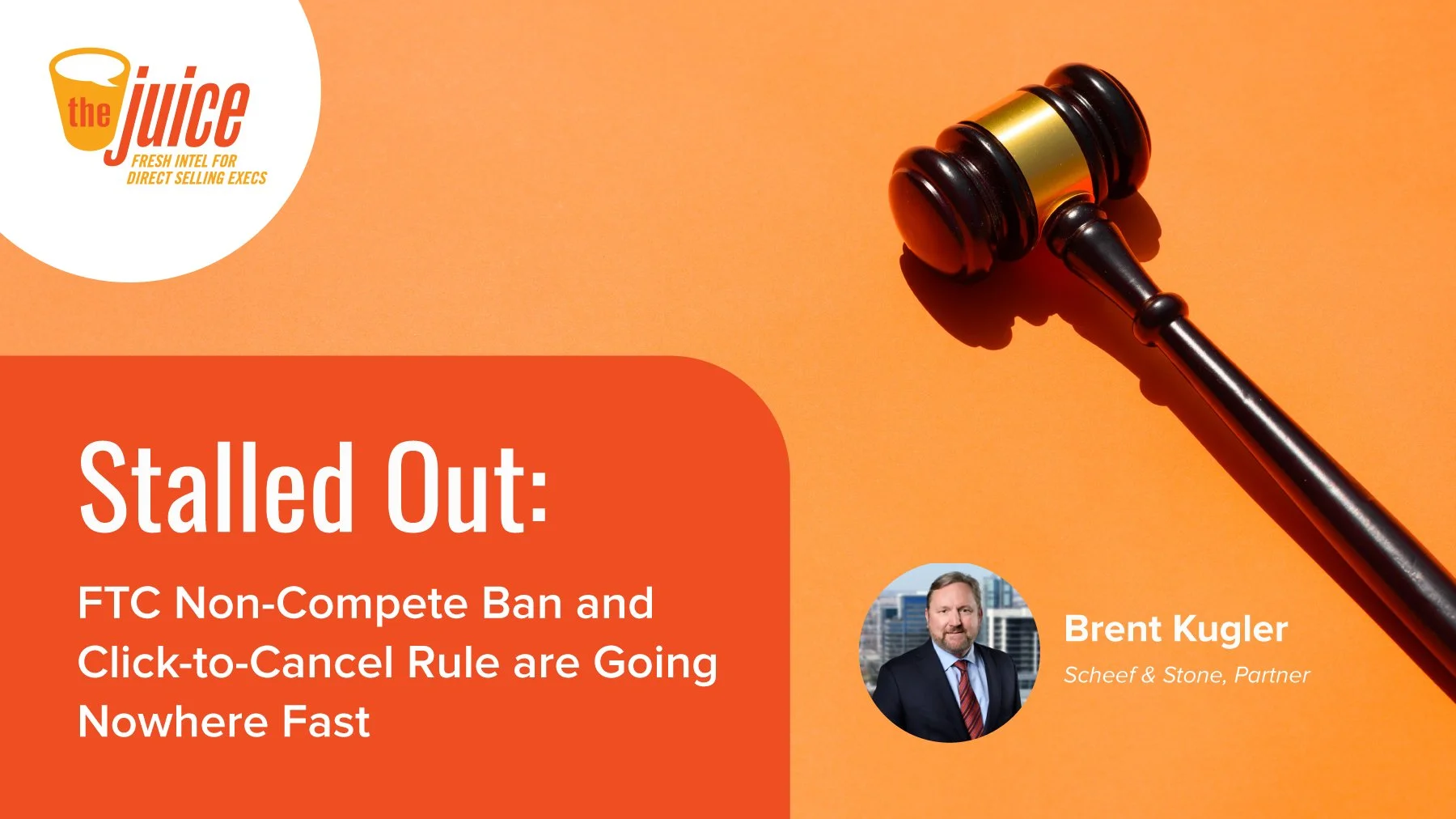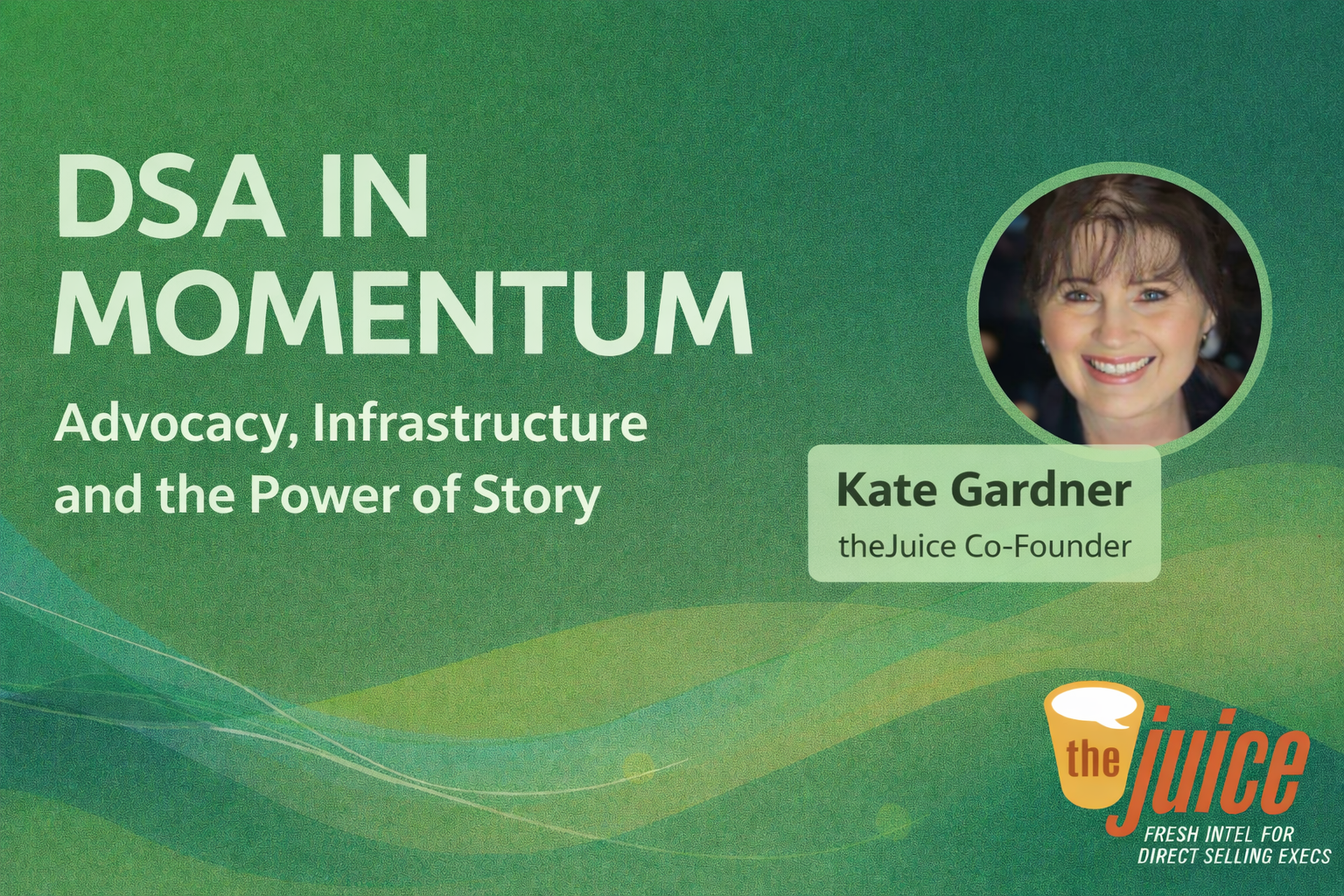Stalled Out: FTC Non-Compete Ban and Click-to-Cancel Rule are Going Nowhere Fast
In 2024, the FTC published two rules widely thought to impact direct selling companies.
First, the FTC published a rule in April 2024 that would have banned the entering into or enforcement of most non-compete agreements in the U.S. The Non-Compete Rule was to go into effect on September 4, 2024. In October 2024, the FTC announced its “Negative Option” Rule, also called the “Click-to-Cancel” Rule, which sought to expand regulations on recurring subscription plans. The Negative Option Rule was scheduled to go into effect on July 14, 2025. As of the date of this article, neither the Non-Compete Rule or Negative Option Rule are in effect or binding upon U.S. companies. So what happened?
The Non-Compete Rule
The Non-Compete Rule was challenged in three courts, two of which ruled against the FTC. The legal arguments advanced in those cases are complicated and have resulted in conflicting decisions by U.S. District Courts that are difficult to reconcile.
For now, these conflicting court decisions are on appeal in the Fifth and Eleventh Circuit Courts, respectively, and implementation of the Rule has been enjoined.
Since that time, changes have occurred at the FTC resulting from the incoming Trump administration. In March of this year, President Trump fired two Democratic-appointed FTC commissioners, Rebecca Slaughter and Alvaro Bedoya (these firings are being challenged in court). Andrew Ferguson, a Republican appointed by President Biden, was named the new FTC Chair. Following these changes, it was expected that Ferguson, who had been a harsh critic of the Non-Compete Rule, would simply rescind the Rule or decline to appeal the adverse District Court rulings against the FTC. On March 7, 2025, the FTC filed motions in the Fifth and Eleventh Circuit Courts asking that the appeals be held in abeyance for 120 days while the FTC considers its position in the ongoing litigation. The filing of these motions was thought to signal that FTC action pulling back the ban on non-compete restrictions was under consideration and imminent. Then, on July 10, the FTC filed a second motion seeking additional time to consider its position regarding the Non-Compete Rule.
While the appeals were pending, the FTC, in February 2025, formed a Joint Labor Task Force to prioritize “rooting out and prosecuting deceptive, unfair and anticompetitive labor-market practices that harm American workers.” The formation of the Task Force suggests that the current FTC Commissioners are not categorically opposed to regulation addressing antitrust issues in the workplace. When announcing the formation of the Task Force, Commissioner Ferguson referred to non-solicitation and non-compete agreements as examples of “deceptive practices and unfair methods of competition” in certain situations.
As of now, there is no clear answer to whether the FTC Non-Compete Rule will ever become effective, or when.
In the past year, the FTC has taken some enforcement actions against companies utilizing no-hire and no-poach agreements, but none of these actions involved non-compete restrictions on workers. In the absence of a full ban on non-compete restrictions, the FTC retains the power to bring enforcement actions against individual companies for engaging in business practices that the FTC considers to be deceptive or unfair that harm workers and the current FTC regime has indicated that it remains interested in regulating non-compete agreements to some extent.
Even as the FTC Rule has stalled, non-compete restrictions are prohibited in several states. This means that even if your company is located in a state that recognizes the validity of non-compete restrictions (and your independent contractor agreement is governed by the law of that state), you may be unable to enforce that restriction against a distributor or consultant that lives in one of the states where non-compete restrictions are unenforceable. Moreover, even if a company's non-compete restriction is legally enforceable, it may still be problematic because the non-compete restriction may be viewed as a control factor suggestive of an employment relationship. This is something to keep in mind if your company imposes a non-compete restriction on salesforce members once they achieve a certain rank. Regardless of rank, the distributor or consultant is still an independent contractor. So even if your company can legally enforce a non-compete restriction, doing so may create a much bigger problem for your company.
The Negative Option (“Click-to-Cancel”) Rule
The FTC’s Negative Option Rule made several important changes to how businesses are required to handle subscription services and auto-renewals.
Among other things, the Rule introduced stringent requirements on providers of negative option programs, including prohibitions on misrepresentations, clear and conspicuous disclosures adjacent to the point of consent, proof of unambiguous affirmative consent, and simple and straightforward cancellation options.
In other words, the Rule created a number of new potential violations of the FTC Act that companies may be subject to.
In Fall 2024, several industry groups filed lawsuits in federal court to block the Rule. In petitions consolidated for review by the Judicial Panel on Multidistrict Litigation before the Eighth Circuit, the petitioners argued that that FTC had exceeded its statutory authority, failed to follow the required rulemaking procedures, and acted arbitrarily and capriciously. The Court of Appeals focused on the parties’ procedural challenge and found that the FTC violated Section 22 of the FTC Act by failing to issue a preliminary regulatory analysis. Such an analysis is required when a proposed rule is expected to have a significant economic impact (defined as $100 million or more). The Court found that this procedural error deprived the petitioners of a meaningful opportunity to comment on alternatives and the cost-benefit analysis of the proposed rule. In an opinion issued on July 8, 2025, the Eighth Circuit vacated the Rule in its entirety based on the fact that the FTC Act and the Administrative Procedure Act require a court to set aside any agency rule adopted in violation of required procedures.
The Eighth Circuit Court’s decision requires the FTC to restart the rulemaking process. This process will take several months, if not longer. Notably, the FTC Commissioners who advocated for the Negative Option Rule are no longer with the Commission. Ferguson, the new FTC Chair, dissented from the original Rule. It is a distinct possibility that the current FTC regime may not take steps to re-issue the Rule. Additionally, the Eighth Circuit’s decision may impact how the FTC approaches future rulemaking. In the future, the FTC will likely apply greater caution in completing economic studies and analyses before finalizing any proposed rule.
In the meantime, the FTC retains the authority to bring individual enforcement actions scrutinizing online terms and conditions and enrollment processes.
According to the FTC, a company’s failure to “clearly and conspicuously” disclose all material terms before obtaining the consumer's billing information is an unfair and deceptive practice in violation of Section 5(a) of the FTC Act as well as a violation of the Restore Online Shoppers’ Confidence Act (“ROSCA”).
For direct selling companies, it is critical that all contract terms, including renewal and cancellation provisions, be clearly and conspicuously provided for review to a prospective participant and that the participant expressly consent to those terms prior to obtaining the participant’s payment information.







